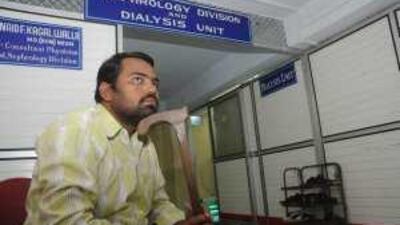NEW DELHI // The effects of potentially fatal gases leaked 24 years ago during the worst industrial disaster in history have left Aqeel Ahmad to cope with a life of debilitating health problems; that a hospital built especially for victims of the Union Carbide gas leak in Bhopal is denying treatment to Mr Ahmad, and thousands of other survivors, has made them victims twice over.
Since the methyl isocyanate leakage at the Union Carbide factory, owned by the US company Dow Chemical, in December 1984, every breath has been a struggle for Mr Ahmad. "My life is not less than a punishment; I would prefer death to such a life," he lamented. At the age of 29, Aqeel has undergone dialysis thrice weekly for the past three years at a private hospital after both his kidneys failed. For three months, he was provided free treatment at the Bhopal Memorial Hospital and Research Centre (BMHRC), but since then the hospital has shut its doors on him.
"I took 17 dialysis treatments from the BMHRC for free, then they told me to get my dialysis done from private hospitals for sometime as there was a shortage of space and staff. They promised me to restart it in a few days. They have now been denying me treatment for three years," Mr Ahmad said. According to the official figures, 15,243 people lost their lives in the Union Carbide disaster. The tragedy also left 574,000 people with lifelong illnesses. The majority suffer from renal, cardiac and ophthalmological disorders. Last month, a US Congress report stated that 15 people die each month from the effects of exposure to the gas.
With more than 80 per cent of the victims from the lower economic strata, the survivors find it hard to bear the expenses for their treatment. "I spend around 20,000 rupees every month on medicine and dialysis. I have borrowed money from everyone I know for my treatment. I am under a debt of 230,000 rupees [Dh17,000]. That's the only way I can breathe," Mr Ahmad said. For Mr Ahmad and the hundreds of thousands like him, BMHRC was their best hope. Built with the compensation money for the victims in 2001 following a Supreme Court ruling, the 500-bed hospital's sole objective was to provide free treatment to the victims of Union Carbide.
Abdul Jabbar, the convener of Bhopal Gas Peedit Mahila Udyog Sangathan (BGPMS), or the Trade Association of the Affected Women Of Bhopal Gas Tragedy, a volunteer organisation, said the hospital has been diverted from its sole objective. "The hospital was constructed after selling the Union Carbide properties at a cost of three billion rupees on court orders. The court had also ruled that all the survivors of this tragedy will be treated free of cost till death," Mr Jabbar said.
Babulal Gaur, the relief minister of Madhya Pradesh, said the state government was not responsible for the running of the hospital because it functions under the direct supervision of the Supreme Court of India and is out of the state government's scope. An official of the memorial hospital who did not want to be named said about 3,700 patients visit the hospital every day and the total number of staff is not more than 450, including doctors and paramedics.
"We are facing a shortage of staff and equipment; just four dialysis machines are functional in the entire hospital for over a 1,000 registered patients. It becomes impossible to attend to all of them," the official said. Many blame the problems at the hospital on government corruption, as a trust for the victims of Bhopal contains Rs6 billion and funding should not be a problem. BGPMS has filed a public interest litigation in the Supreme Court of India seeking its intervention to re-implement its earlier ruling of providing free treatment at the hospital to the victims in letter and spirit. "We have filed a PIL in the Supreme Court last month, the case will come up for hearing next month." Mr Jabbar said.
In 2006, 17 patients died as the hospital's staff went on strike to demand higher wages. This caused widespread street protests from victims and advocate groups. Mr Jabbar, who has spent the past 24 years with the victims of gas tragedy, said that the number of patients denied treatment is unbelievably high, but most cases go unreported. "They know nothing will happen. It's an eternal suffering and it ends with death."
@Email:jandrabi@thenational.ae

